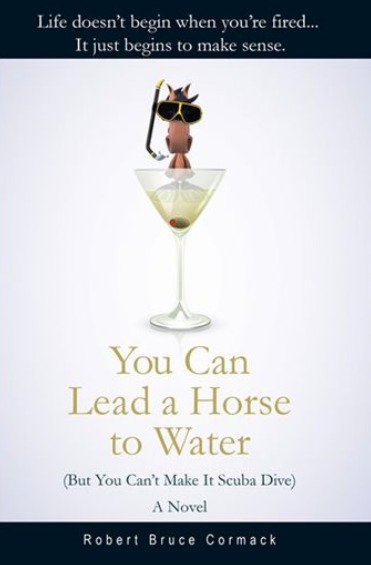Why History Hates Us.
We keep repeating ourselves...and not in a good way.

“If past history was all there was to the game, the richest people would be librarians.” Warren Buffett
I’m sure everyone knows the saying, “If we don’t understand history, we’re bound to repeat it.” I think Henry Ford said that, but it might have been Sophocles or Warren Buffett. It wasn’t a librarian. Librarians understand history less than anyone I know. They’re surrounded by it, so they ignore it. We all do. We like history about as much as we like liver.
Jay Leno used to do this routine where he’d go out on the street and ask people questions about America’s past. Here’s one that stumped everyone: “Where did Lincoln give The Gettysburg Address?” My favourite response was “At his house?” Jay thought that was hysterical.
When asked to point our North Korea on a map, three people pointed to Chile, one to Greenland, and one to a button on Leno’s shirt.
Buffett makes an interesting point above. Librarians would be a lot richer if history was a commodity. It’s not, obviously, so we concentrate on things that are more self-gratifying. Who cares where Lincoln gave the Gettysburg Address? Some people simply shrugged at Leno, figuring they’d do better on the movie segment. Jay didn’t have any movie questions. He moved onto geography, which was a wash as well. Geography is sort of like Latin. If you know Latin, you understand where our words come from. If you know geography, you understand where history comes from.
Unfortunately, people didn’t do any better at the geography questions. When asked to point our North Korea on a map, three people pointed to Chile, one to Greenland, and one to a button on Leno’s shirt.
Everyone laughed, but it was a nervous laugh. Imagine if we were ever invaded. It would be pretty embarrassing if we didn’t at least know where the invaders were from. It would also be worth knowing if the invaders tend to shoot a lot of people. Believe me, lots of axis powers are trigger-happy, and I’m sure they wouldn’t think twice about shooting Jay Leno.
Someone once said about the Wild West: “When white men win a battle, it’s called a victory. When Indians win, it’s called a massacre.”
The point is — as Buffett infers— we aren’t history buffs. Most American history is re-written, anyway. What we don’t like, we change. Indian genocide? Never happened. Manifest destiny? Mexico’s fault, not ours. Someone once said about the Wild West: “When white men win a battle, it’s called a victory. When Indians win, it’s called a massacre.”
Changing “the spin” is something we do so well, only it leaves us far more vulnerable than we think. If we believe history is always “on our side,” we forget that we weren’t always winners, and we weren’t always good.
Take the story of Custer and the Battle of Little Big Horn. It was one of the biggest gaffs in American history. Custer was supposed to wait for two larger regiments to join him before attacking a Sioux encampment. He got impatient and sent in his troops, not realizing he was outnumbered 10 to 1.
It was a horrible slaughter, with newspapers describing the Indians as “heathen butchers” and painting Custer as a national hero. In reality, Custer made a colossal error in judgment, costing thousands of lives. He didn’t even die heroically. He was found naked with an arrow through his penis.
He was a Radical Republican, and many Radical Republicans were hunted down and killed along with thousands of blacks.
We think of Abraham Lincoln as the man who ended slavery. He was actually dead by the time the Reconstruction Act came into effect. It was President Ulysses Grant who fought through two terms in office to give blacks equal rights. He was a Radical Republican, and many Radical Republicans were hunted down and killed along with thousands of blacks.
By the time Grant finished his second term of office, everything he tried to do for blacks (known as Free Men) slowly drifted back. Democrats gained seats in the South (often through violence and intimidation), and Northern audiences grew bored with the whole idea of Reconstruction.
Figuring he might as well increase his popularity with southern blacks, he introduced what was essentially the same bill Grant wanted passed in 1880.
Civil rights wouldn’t occur until the 1960s, meaning Americans dilly dallied all that time. We only got a Civil Rights Bill because President Lyndon B. Johnson cocked up Vietnam so bad. Figuring he might as well increase his popularity with southern blacks, he introduced what was essentially the same bill Grant wanted passed in 1880. Johnson became the great “savior of civil rights.” Grant became the president who never got anything done.
So why am I bringing this up? Because historically, we’ve done the same thing over and over again. Eisenhower was the same as Grant, a great general, a budding socialist, but in the end, more general than president, and people definitely don’t like their presidents to be generals or their generals to be presidents. They like the idea, just not the practice.
History, in other words, repeats itself based on the era, what Neil Howe and William Strauss called “generational cycles” in their book Millennials Rising. Without going into a ton of detail, we have periods between wars when everything seems pretty good. Economies grow, crime goes down, and we do what we always do, which is become selfish.
Teddy developed a park system that represented millions of acres, something Trump has been trying to undo ever since he was elected.
Howe and Strauss call it the Civic Generation because we try to “clean things up.” This can apply to feminism or environment or anything we believe needs fixing. We forget that feminism has been fought since the 1800s, and environment made its greatest strides during the first Roosevelt Administration. Teddy developed a park system that represented millions of acres, something Trump has been trying to undo ever since he was elected.
Everything gets undone, in other words, as we move through cycles of selfishness, until small wars become big wars, and we move to a cycle of sympathy and empathy. This is based on us getting our asses shot off in places we can’t even find on the map (according to Jay Leno).
We’re actually shocked this could happen. How do we get ourselves involved in something so incredibly destructive as war? We should know better, but we don’t because we don’t spent enough — or any — time with history. If we did, we’d realize, we’ve been on this monotonous trajectory since civilization began. What makes it so shameful is it occurs while we’re being selfish and trying to get things done at home.
President Franklin D. Roosevelt had a hell of a time even getting America into the Second World War. Americans simply said, “Hey, we’re worried about ourselves. Let Europe take care of themselves.”
Through many “Fireside Chats,” which Roosevelt didn’t even like, he tried to convince Americans that this wasn’t a European or Asian conflict. Nazis were intent on world domination.
Through many “Fireside Chats,” which Roosevelt didn’t even like, he tried to convince Americans that this wasn’t a European or Asian conflict. Nazis were intent on world domination. This was evidenced by German U-boats being spotted at the mouth of the St. Lawrence (my father was stationed at the Welland Canal trying to keep the Nazis out of Lake Erie).
No wonder history hates us. For all our good intentions, we just keep going through the motions. We repeat, forget, repeat again, forget again, without feeling the slightest bit bored or stupid.
It’s possible the only reason we haven’t found intelligent life forms in the universe is because they’re ignoring us. Watching our antics is like being in a movie theatre hearing everyone scream “BERNIE’S DEAD, YOU IDIOTS!”
We’re monotonous and history hates us for that (as do most intelligent life forms out there). Which begs the bigger question: Is there something we can do? Can we prevent wars? Can we turn ourselves more outward?
We can start by understanding history, and not the altered form that makes heroes out of idiots. We could also spent more time on geography so we don’t mistake Vietnam for one of Jay Leno’s shirt buttons.
The simple answer is yes. We can start by understanding history, and not the altered form that makes heroes out of idiots. We could also spent more time on geography so we don’t mistake Vietnam for one of Jay Leno’s shirt buttons. Most of all, we could recognize cycles, particularly those that have us worrying about political correctness when we should be worried about guys like Trump who history hates more than us.
I know I’m sounding overly simplistic, but we know well in advance when war will occur, or rich billionaires will dominate the economy, or we’ll be dilly dallying over human rights. We’ve been there before. History has it all laid out with plenty of warning signs — and even ways to avoid conflict.
Well over two hundred years ago, both Thomas Jefferson and George Washington warned about rich organizations taking over. The Constitution was literally created to make sure this never happened. It did anyway, and like Warren Buffett said, rich people would be librarians if history concerned people more. We let this happen, and now less than one percent of the population owns over 70 percent of the world wealth.
If they can dress up a man who was found naked with an arrow through his penis, imagine what they can do with presidents who only care about staying elected.
That may be a low estimate since rich people own newspapers, and it was newspapers back in the 1800s that made Custer a hero. If they can dress up a man who was found naked with an arrow through his penis, imagine what they can do with presidents who only care about staying elected.
In other words, it’s essential we understand history or we’re doomed to repeat it. If that happens, you can bet intelligent life forms out in the universe will be screaming “BERNIE’S DEAD, YOU IDIOTS,” and librarians and Jay Leno will be shaking their heads.
And no doubt history will hate us again.
Robert Cormack is a novelist, journalist and blogger. His first novel “You Can Lead a Horse to Water (But You Can’t Make It Scuba Dive)” is available online and at most major bookstores. Check out Skyhorse Press or Simon and Schuster for more details.

Articles from Robert Cormack
View blog
This could (and should) change your writing entirely. · “It’s better to fail at originality than suc ...

All I did was write the first Canadian rock jingle. · I still remember how we wore our jeans with le ...

This is the latest issue of Rosebud Magazine (#69), marking my twenty-year relationship with publish ...
Related professionals
You may be interested in these jobs
-

Lead product designer to design director
Found in: beBee S2 CA - 1 day ago
Pixel-1 Canada Full timeNot open to agencies or freelancers, looking for someone in-house that can evolve to be a director of design. · About Us: We are a burgeoning design agency focused on sculpting the future of B2B SaaS products and websites. Although we maintain a low-key presence now, our ambition ...
-

Director of Information Systems
Found in: Talent CA C2 - 4 days ago
TalentSphere Staffing Solutions Niagara Falls, CanadaDirector of Information Systems & Operations · Location: Niagara Region - ON-SITE · (Relocation Expense) · Industry /Business: Consumer Goods, E-Commerce · About the Job: · My client is looking to add a Director of Information Systems & Operations to join their team. Reporting to ...
-

Livreur(e) temps partiel
Found in: Talent CA C2 - 2 weeks ago
St-Hubert Ange-Gardien, Canada Part timeDescription de l'entreprise · Les Rôtisseries St-Hubert, c'est une histoire de passion depuis 1951. Notre service attentionné, nos saveurs signature et nos ingrédients de qualité supérieure ont fait la renommée de nos plats, qu'ils soient servis dans nos restaurants ou livrés à v ...

Comments
Robert Cormack
4 years ago #12
A bit of a pipe dream at the best of times, but that's why there's fiction—actually there's a lot of historical fiction, or history that should be listed as fiction, or fiction that should be labelled as history. Same deal either way.
Robert Cormack
4 years ago #11
Pascal Derrien
4 years ago #10
Paul Walters
4 years ago #9
Robert Cormack
4 years ago #8
I suspect our dog is a lot more intelligent than he lets on. In fact, I'm pretty sure he does a lot more with The New York Times than tear it up. I believe the "tearing up" is actually frustration with the current administration.
Robert Cormack
4 years ago #7
Cyndi wilkins
4 years ago #6
John Rylance
4 years ago #5
Robert Cormack
4 years ago #4
Ken Boddie
4 years ago #3
Ha ha. I’ll add this to list of must do’s, Robert, along with always lifting the toilet seat to check for resident spiders. Rather get bitten on the finger than have to find out who your best friend is when you need the poison sucked out of where the sun doesn’t shine.
Robert Cormack
4 years ago #2
Ken Boddie
4 years ago #1